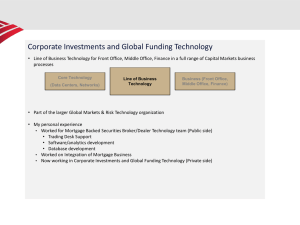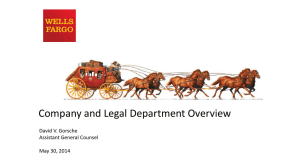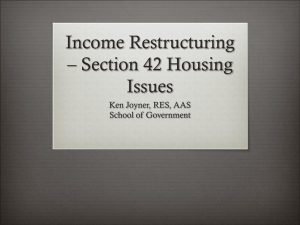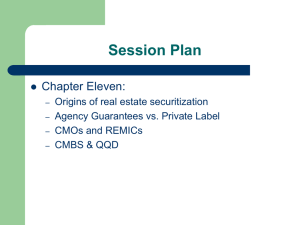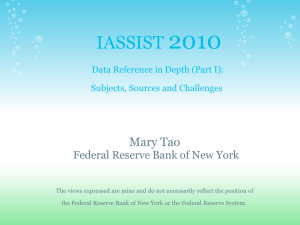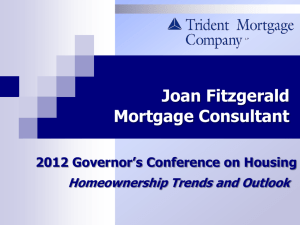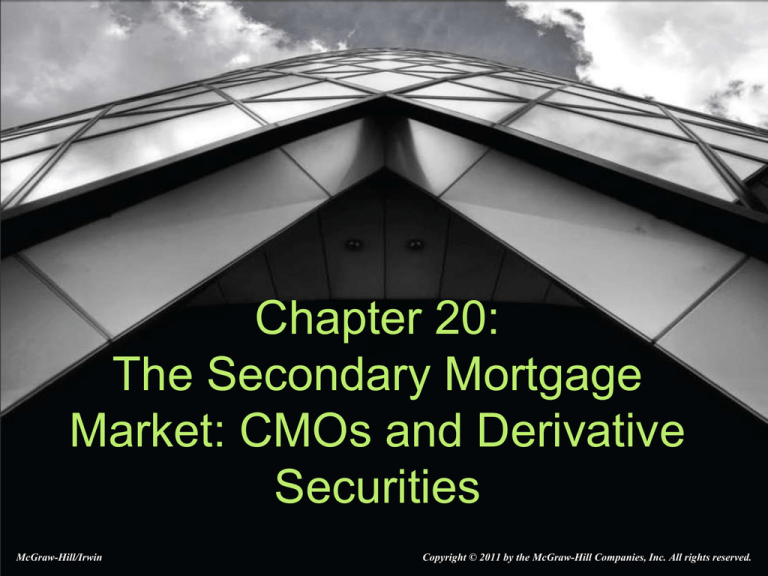
Chapter 20:
The Secondary Mortgage
Market: CMOs and Derivative
Securities
McGraw-Hill/Irwin
Copyright © 2011 by the McGraw-Hill Companies, Inc. All rights reserved.
Secondary Mortgage Market
Mortgage Pay-Through Bonds
– Bond, not an equity ownership interest
– Debt obligation of issuer
– Pass-through of interest and principal
– Credit rating derives from three things
Riskiness of mortgages
Extent of over collateralization
Whether or not there are US gov’t bonds or agency
obligations as excess collateral
20-2
Secondary Mortgage Market
Collateralized Mortgage Obligations
– Debt instrument
– Mortgage pool owned by issuer
– Pass-through of interest and principal
– Multiple classes of securities issued
Different maturity classes
Different priority for payment of principal and
interest
Tranches
20-3
Secondary Mortgage Market
Collateralized Mortgage Obligations
– Over collateralization
Represents equity interest of issuer
Residual cash flow is return to issuer
Cash flow = interest earned – interest paid
Prepayment problem
Reinvestment problem
Calamity call
20-4
Secondary Mortgage Market
Collateralized Mortgage Obligations
– Sequential Payout Tranche Structure
Tranche Z: Paid Last
Tranche A: Principal, Prepayments, & Interest
Received First
Tranche B: Interest Only Until Tranche A is Paid
Etc. for any additional tranches
20-5
Secondary Mortgage Market
Collateralized Mortgage Obligations
– Expected Maturities
– Pricing & Prepayment
– Tranche Variations
Sinking Fund Structure
∙ Planned amortization class tranche
∙ Targeted amortization class
» Pricing speed
∙ Companion tranche
20-6
Secondary Mortgage Market
Collateralized Mortgage Obligations
– Floating Rate Tranches
Floater Tranche
∙ Coupon rates adjust periodically
Inverted Floating Rate Tranche
∙ Coupon rate adjusts opposite to its index
Scaling
Used as a Hedge
Yield Enhancement
20-7
Secondary Mortgage Market
Collateralized Mortgage Obligations
– Principal Only Tranches
Similar to a Zero-Coupon Bond
– Interest Only Tranches
– Convexity
20-8
Exhibit 20-15
Summary of Important Investment Characteristics of
Mortgage-Related Securities
20-9
Secondary Mortgage Market
Commercial Mortgage-Backed Securities
– Similar in form to residential MBSs
Default risk differs significantly
– Assets in mortgage pool
Often interest-only
Lump sum principal payment
20-10
Secondary Mortgage Market
Commercial Mortgage-Backed Securities
– Senior Tranche (A piece)
– Subordinate Tranche (B piece)
– Prepayment is less likely than residential
mortgages
Lockouts
Yield Maintenance
– Extension Risk
20-11
Secondary Mortgage Market
Commercial Mortgage-Backed Securities
– First Loss Position
– Credit Ratings
– Credit Enhancements
Issuer or 3rd party guarantee
Surety bonds and letters of credit
Advance payment agreements
20-12
Secondary Mortgage Market
Commercial Mortgage-Backed Securities
– Credit Enhancements
Loan substitutions and repurchase agreements
Lease assignments
Over collateralization
Cross-collateralization and cross-default
20-13
Secondary Mortgage Market
Collateralized Debt Obligations
–
–
–
–
–
–
Broader range of collateral
B notes (subordinated position of mortgage)
Lower rated Commercial Mortgage-Backed Securities
Mezzanine Loans
Preferred Equity
While they are often well diversified, the underlying
risk is still substantial. The assets are risky.
Managed Collateralized Debt Obligations
20-14
Exhibit 20-19
Illustration of CDO Structure
20-15
Secondary Mortgage Market
Real Estate Mortgage Investment
Conduits (REMICs)
– Creation of Tax Reform Act of 1986
– Qualified Mortgages
– Foreclosed Property
– Interest Bearing Assets
– Qualified Reserve Fund
20-16




